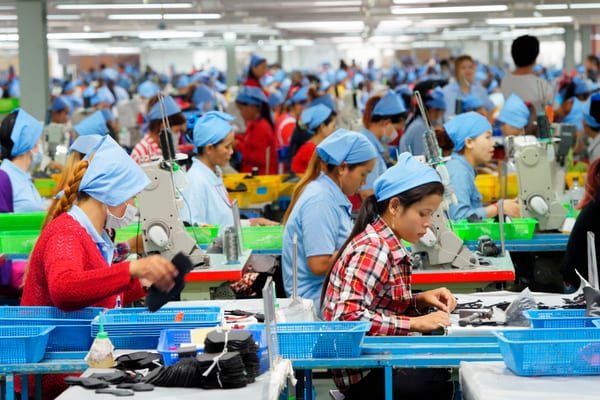Highlights from the 2019 Global Forum for Responsible Recruitment
25 October 2019

In the effort to ensure that consumer goods and services are free from exploitation, there is a growing focus on regulation of corporate conduct and the enactment of reporting requirements to improve transparency. A more sophisticated understanding of modern slavery is also emerging, with an increasing focus on the ways that it can be embedded systemically within business operations. Ensuring the responsible recruitment of migrant labour workforces is an area within this agenda that is now firmly established as a key issue for business and government committed to eradicating modern slavery and forced labour.
Migration for work is a significant factor in the economic vitality of countries – both of origin and destination – and recruitment services for migrant workers are an important part of the global business landscape. Due to endemic unethical practices, they have also become a key area of focus for those seeking to prevent worker exploitation. The development of a more professional and ethical recruitment industry also delivers many benefits to business. For migrant workers, improved recruitment processes would make migration for work easier and ensure that the benefits of working abroad can be fully realised.
Download the Summary Appendix of the Breakout Group sessions on i) Blockages, Gaps, and Inhibitors to the Employer Pays Principle and ii) Access to Effective Grievance Mechanisms
Read on for the key highlights from the 2019 Global Forum for Responsible Recruitment.
About the Global Forum
The 2019 Forum was a business-focused event bringing together global brands, suppliers, recruitment agencies, governments, civil society organisations, and migrant worker representatives.
There are a large number of initiatives and workstreams being undertaken by a wide variety of business, civil society, and government actors that seek to improve recruitment practices. IHRB believes that these efforts and the increased profile of responsible recruitment have been significantly enhanced by a series of three annual Global Forums for Responsible Recruitment. The Global Forums – uniquely focused on the responsible recruitment agenda – add great value in bringing together stakeholders from across the private, public, and third sectors to discuss the practical challenges, inhibitors, and gaps toward eradicating worker-paid recruitment fees and costs.
The 2019 Global Forum for Responsible Recruitment was hosted from 9-10 July in Bangkok, Thailand by the Institute for Human Rights and Business (IHRB), Leadership Group for Responsible Recruitment (LGRR), Humanity United, International Organisation for Migration (IOM), and Migrant Forum in Asia (MFA).

Building on the experience of previous Forums in Berlin 2017 and Singapore 2018, the 2019 Global Forum for Responsible Recruitment in Bangkok examined the continuing efforts by businesses, civil society organisations, and governments as well as highlighting challenges and successes. As in previous years, the 2019 Forum was a business-focused event bringing together global brands, suppliers, recruitment agencies, governments, civil society organisations, and migrant worker representatives.
The Forum’s agenda:
- Provided a global overview of current actions to promote responsible recruitment
- Positively promoted the experience of migrant workers
- Included facilitated table discussions to list key challenges in delivering responsible recruitment for different stakeholders.
While the Global Forum was a business-focussed event, the perspectives of government representatives from Australia, Thailand, and Qatar, responsible for overseeing migrant worker recruitment added a crucial component by reviewing legislative, regulatory, and enforcement efforts from around the world. The inclusion, as partners, of Migrant Forum in Asia – who represent a large number of migrant worker support groups – and of Shramik Sanjal – an association of migrant workers from Nepal – also provided platform to migrant workers themselves advocating for improved standards and practices for them and their fellow workers in every industry and country.
Urgency
We are still far from the tipping point of mainstreaming the Employer Pays Principle to eradicate worker fees within ten years.
The Leadership Group for Responsible Recruitment announced in 2016 an ambitious ten-year target to eradicate worker-paid recruitment fees by 2026.
This can be achieved only through wide-scale adoption and implementation of the Employer Pays Principle throughout labour supply chains. Three years on, we are still far from the tipping point of mainstreaming the Employer Pays Principle to eradicate worker fees within ten years. Despite tangible progress in some quarters, a sense of urgency was palpable. Speakers regularly emphasised the need for concrete actions and progressing beyond policies and commitments, while workshop sessions enabled the digging in to persisting barriers and levers to accelerate pace towards achieving the 2026 goal.
We are doing a lot and things are moving, but they are not moving quickly enough…. We will miss the target unless we do not scale up
John Morrison
Chief Executive for Institute for Human Rights and Business (IHRB)
Worker voice
Migrant workers are the only players with first-hand experience of the methods and mechanisms used for flouting policy commitments and disguising non-compliance.
Co-hosts Migrant Forum in Asia, as well as Shramik Sanjal, ensured worker voice was central to the 2019 Global Forum discussions. Migrant workers are the only players that have the first-hand experience of the methods and mechanisms used for flouting policy commitments and disguising non-compliance. Their voices are, therefore, key to effectively implementing commitments in local contexts and overcoming the barriers unique to each operating environment and section of the value chain.
Shramik Sanjal shared with participants recommendations from a survey of migrant workers for any business seeking to adopt responsible recruitment approaches. These recommendations are essential reading for any organisation committed to the Employer Pays Principle. Migrant worker representatives joined brands and suppliers in calling for better government regulation and less red tape to make formal recruitment a cheaper, faster option than informal channels.
Migrant workers are an integral part of the economy and we understand our issues better than anyone else. It is important we are represented at forums like this… I want the business leaders to take responsible action for recruitment fees.
Migrant worker representative Bhim Shrestha
Shramik Sanjal, Nepal
Access to effective grievance mechanisms and remedy is also key factor in successfully improving migrant worker experiences during employment abroad. This substantive area was the subject of one of two breakout sessions where participants were split into small groups for facilitated, deep-dive discussion. The questions posed to participants probed how migrant workers can and should share information on their recruitment process, formally and informally, how to assess the effectiveness of those communication channels, and what lessons can be drawn from good practice models such as the ETI's Grievance Framework.
The contribution of workers to the debate was also referenced in a statement by Sharan Burrow, General Secretary of the International Trade Union Confederation (ITUC), who highlighted the fundamental role of unions and the importance of ensuring the freedom of workers to organise and bargain.
The inclusion of migrant workers directly in the Forum dialogue was also a reminder to all attendees of why so many workers leave their homes and families. Due mostly to a lack of opportunities in their own communities, employment abroad is often the only option to support themselves and their families. But with high demand for good jobs abroad, potential migrants become vulnerable to false promises and illicit practices.
We need to make migration a choice, not a necessity.
Comment from the floor of the Global Forum 2019
Collective action
There has been visible progress over recent years in the number of global brands committing to the Employer Pays Principle or its equivalent.
Leading companies such as Nike gave recognition to the opportunity they have to leverage the strength of their brand in standing up for their values while reaping the benefits of responsible recruitment at the same time. In so doing, this also helps create a level playing field for all.
Only by having brands, workers, suppliers, employment and recruitment agencies collaborate and reinforce individual efforts can this leverage be scaled to establish employer-pays models as the norm around the world.
The example of Thai Union working up and down-stream with Nestlé, International Focus Recruitment Agency from Myanmar, and CSO Migrant Worker Rights Network provided a compelling cross-sectional view of the entire recruitment process and how recruitment models can be developed involving a variety of different stakeholders that prevent exploitation
Spotlight on Qatar
Unique steps to streamline and make more transparent the recruitment process.


